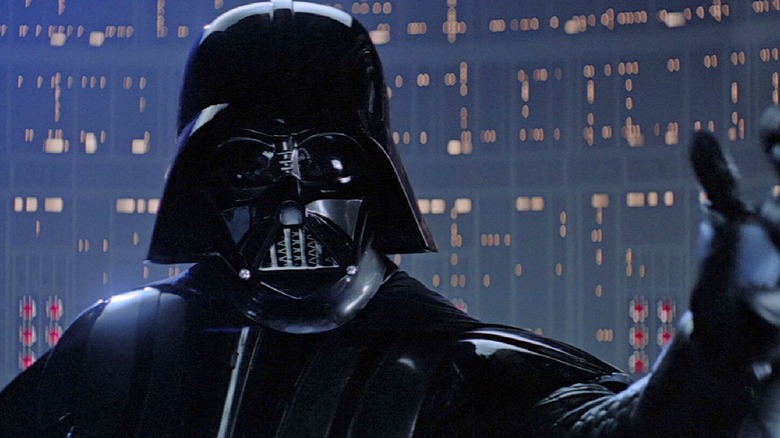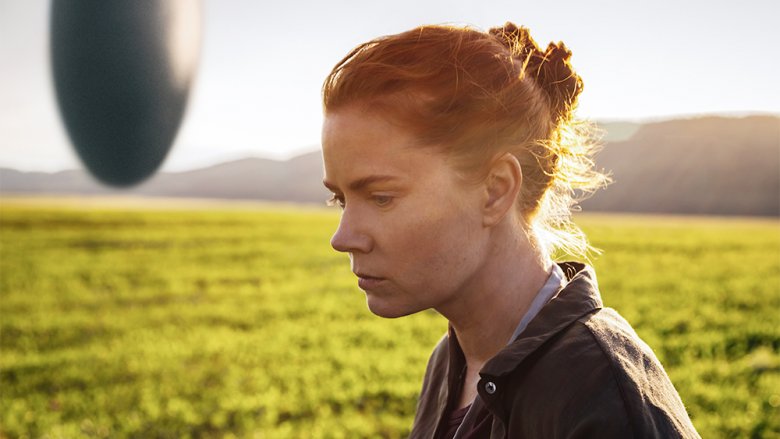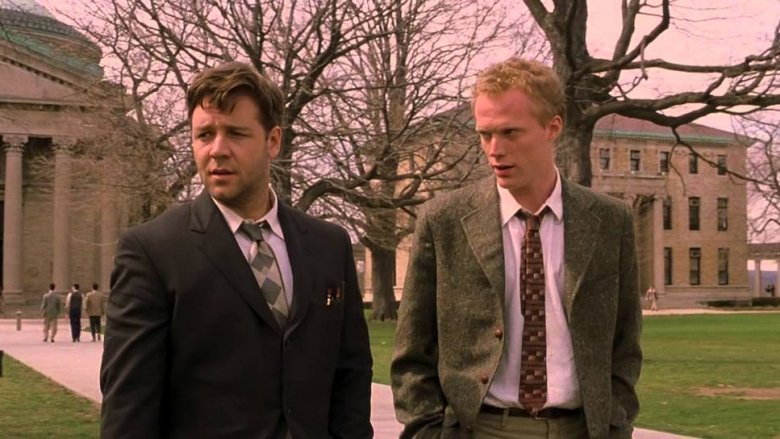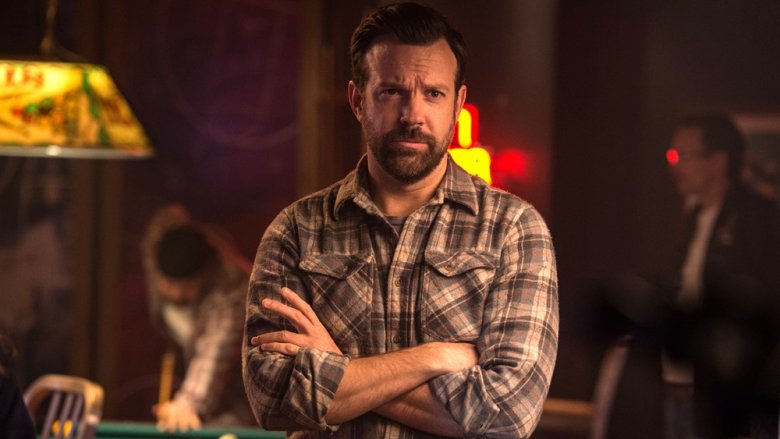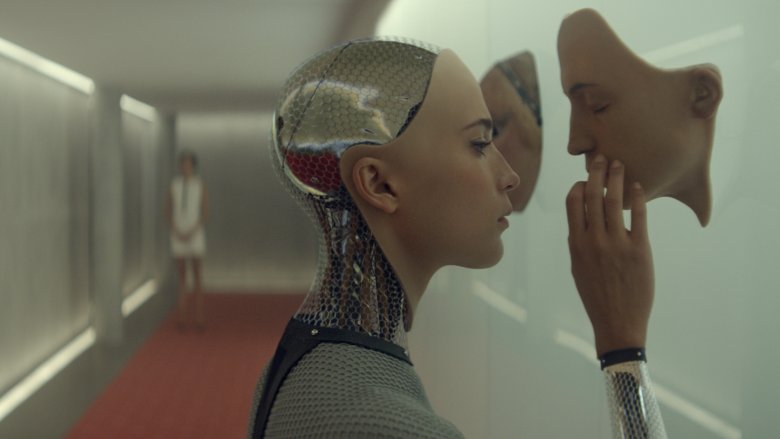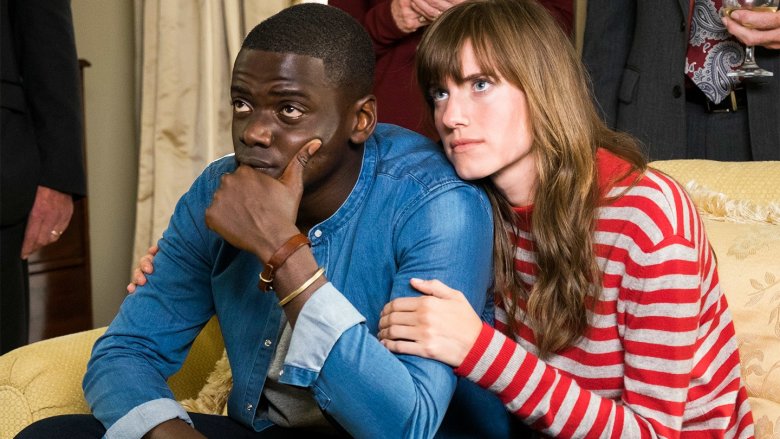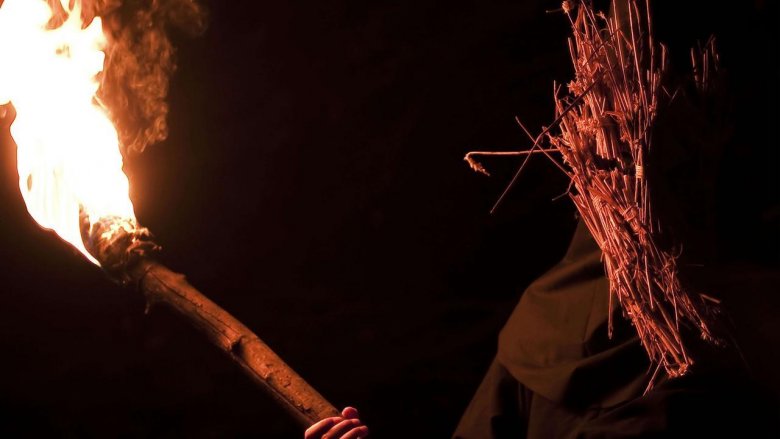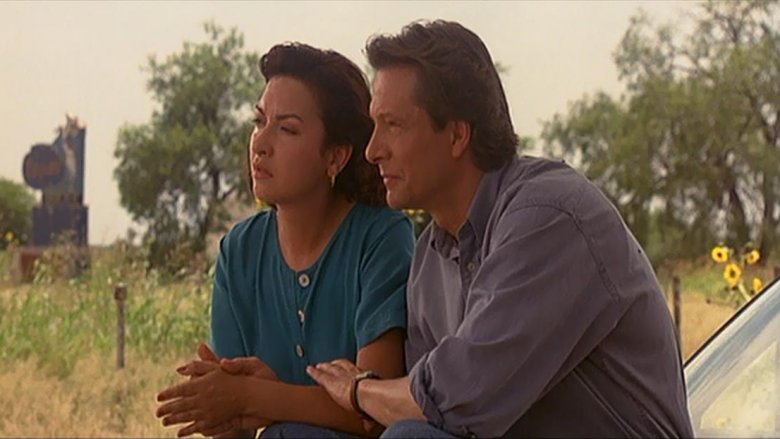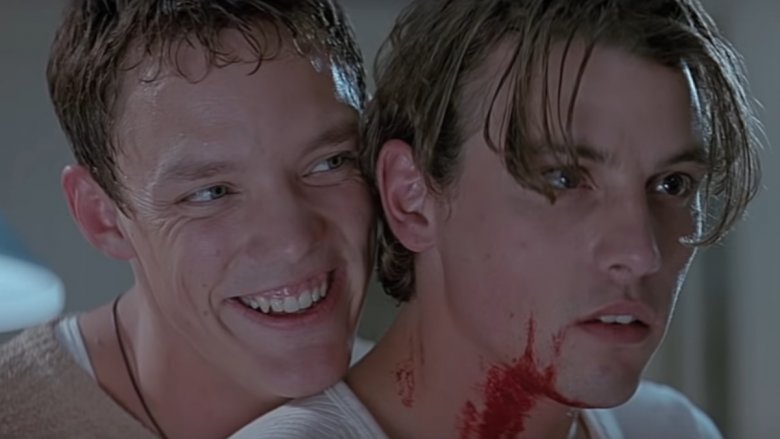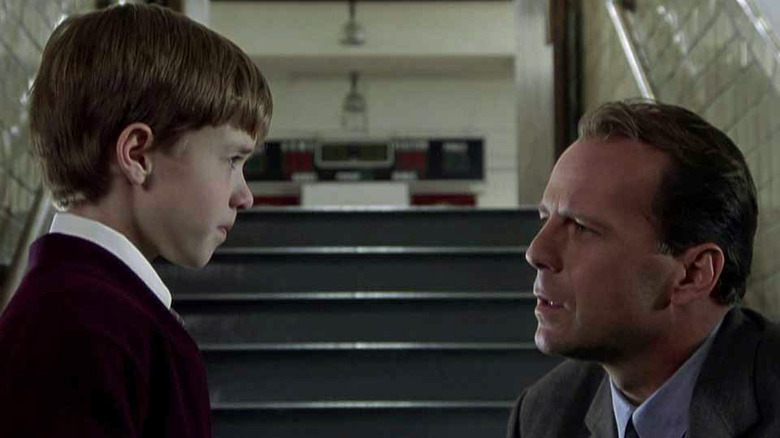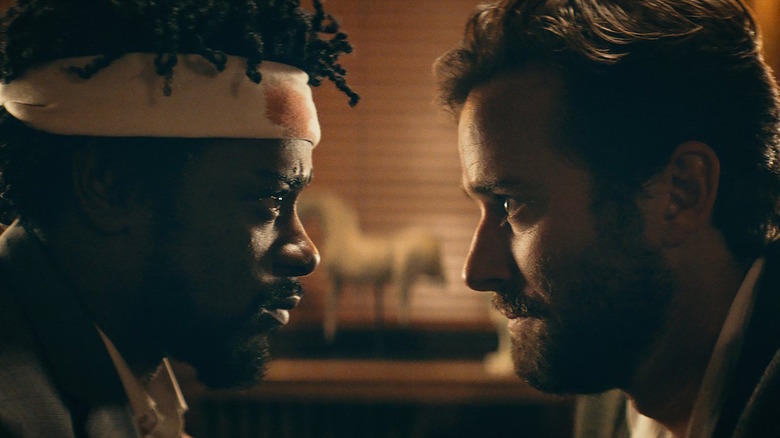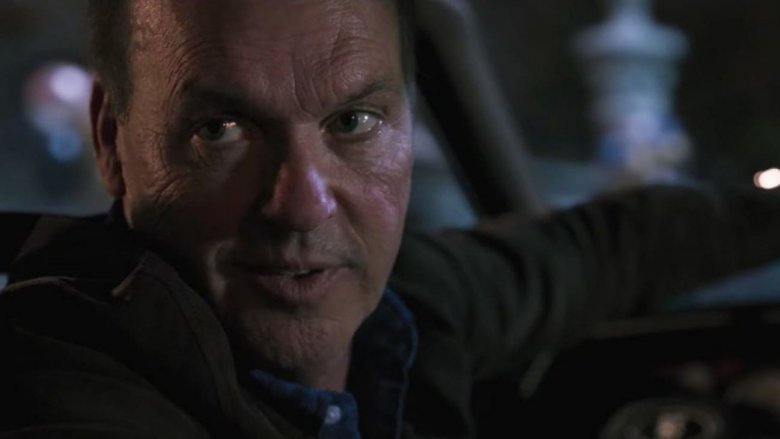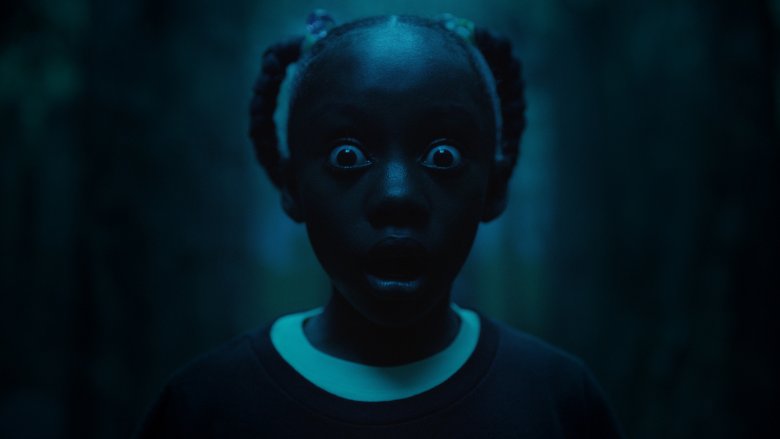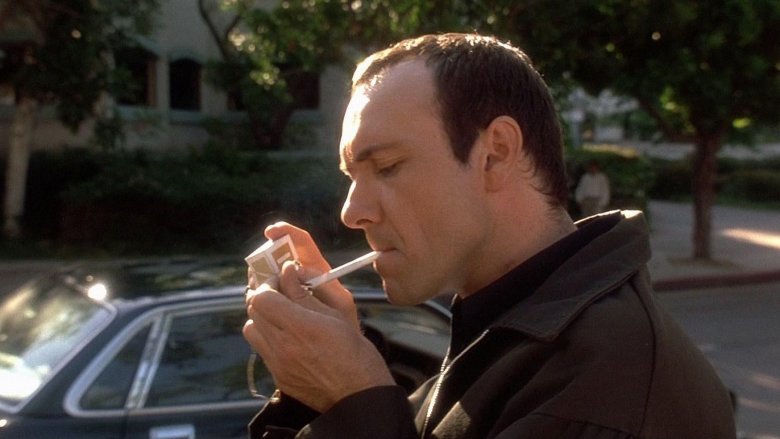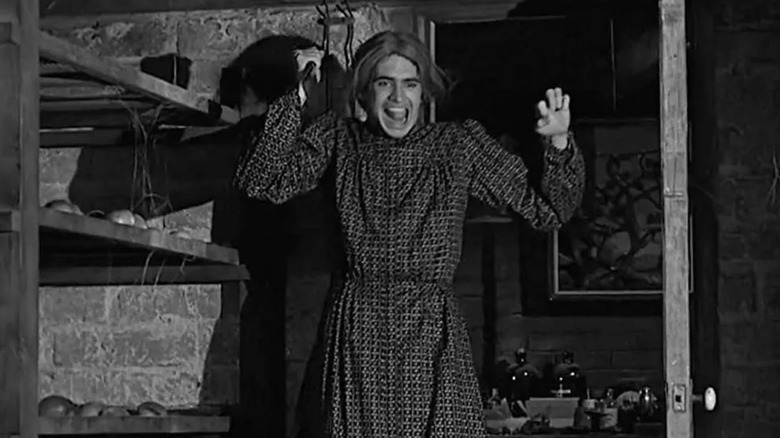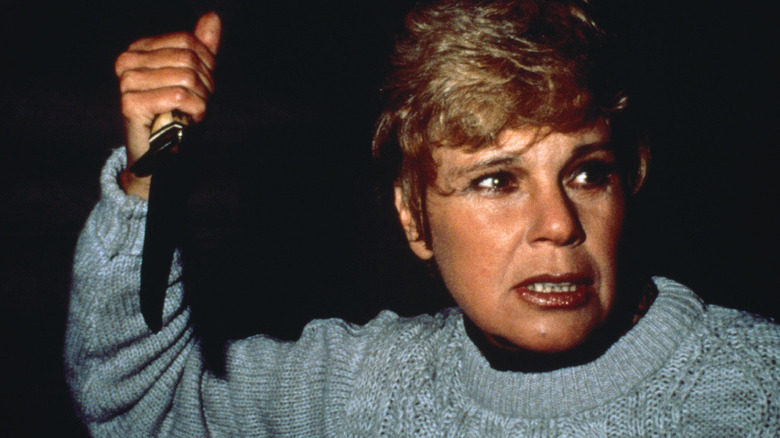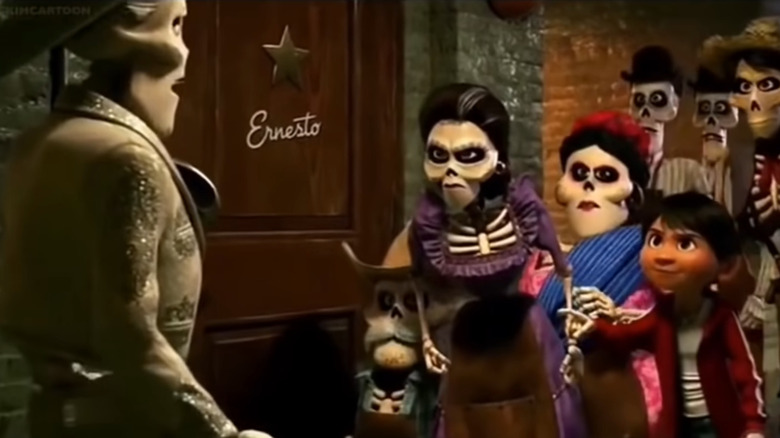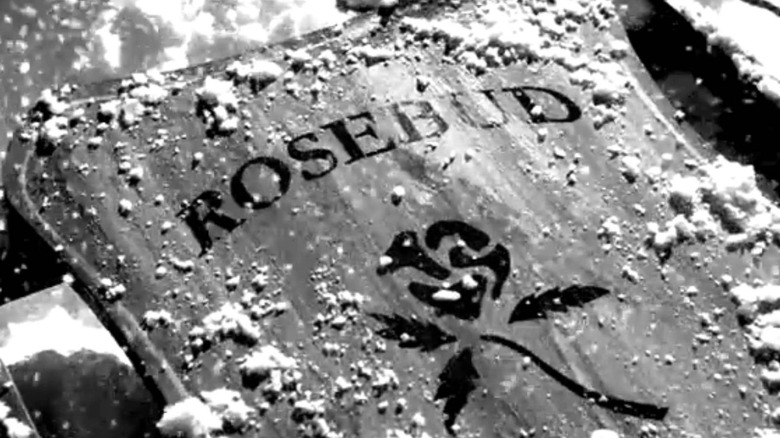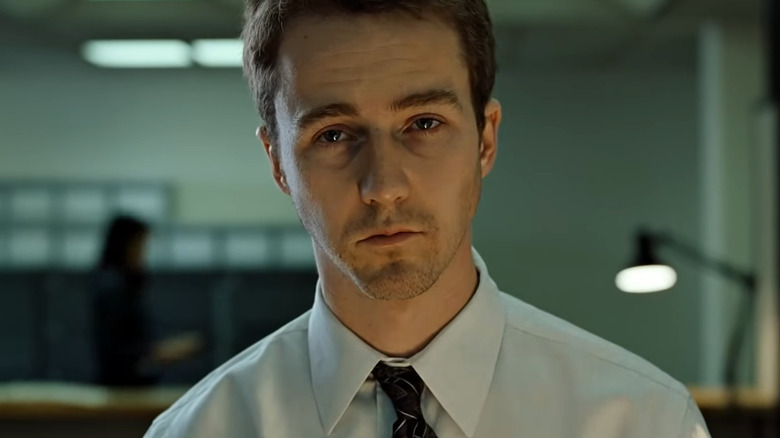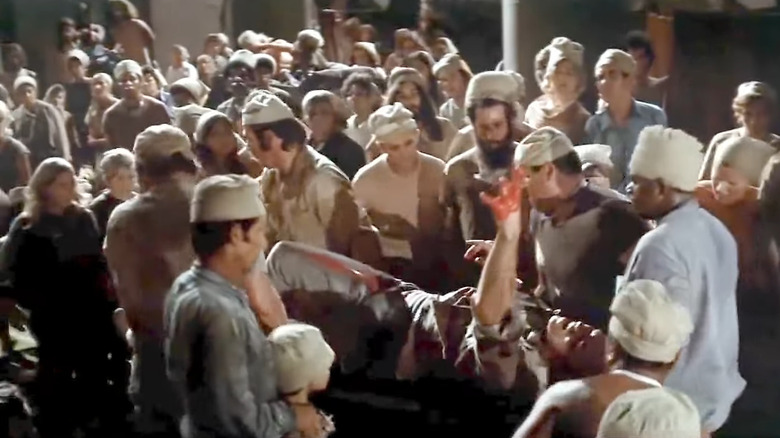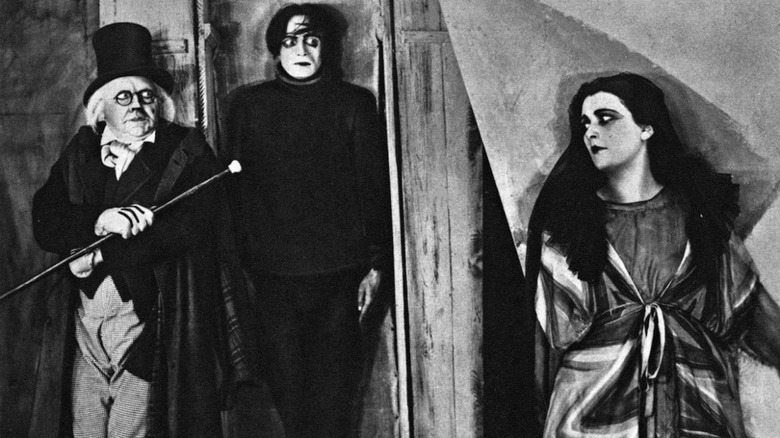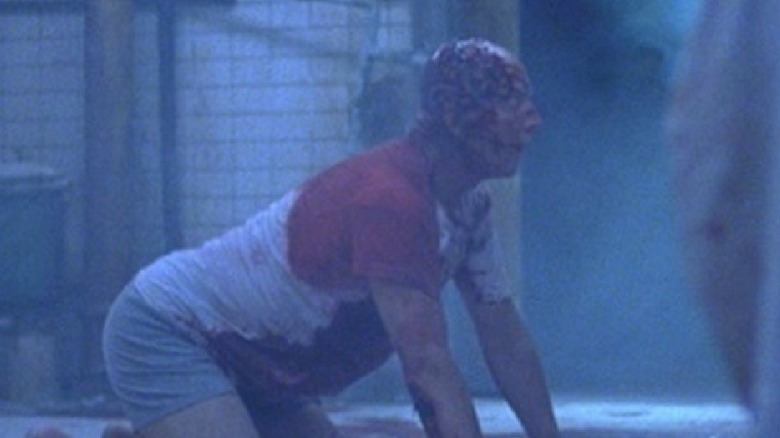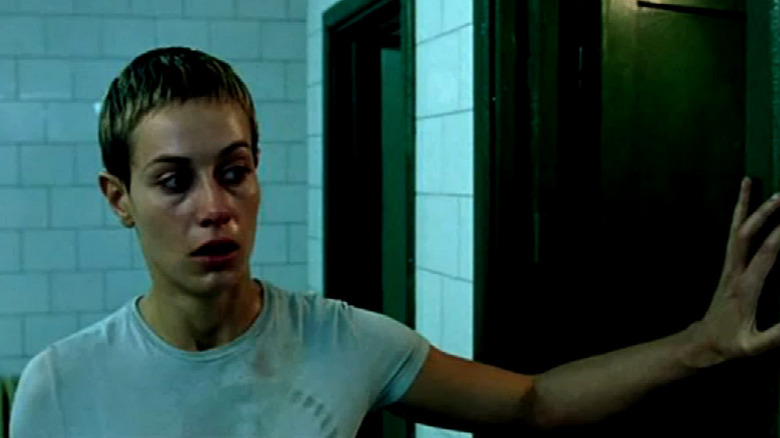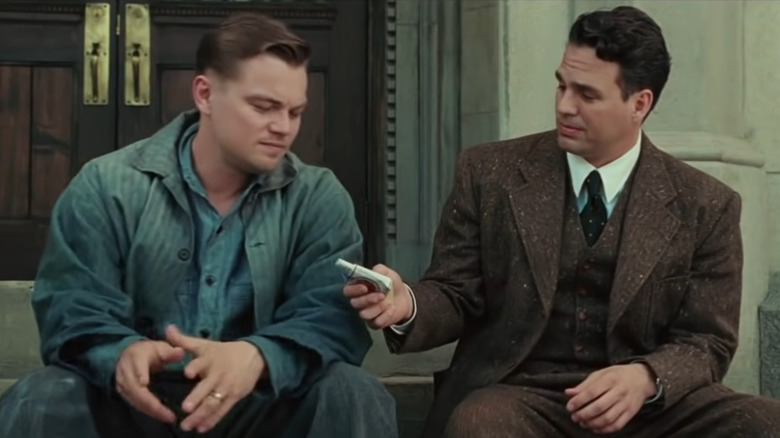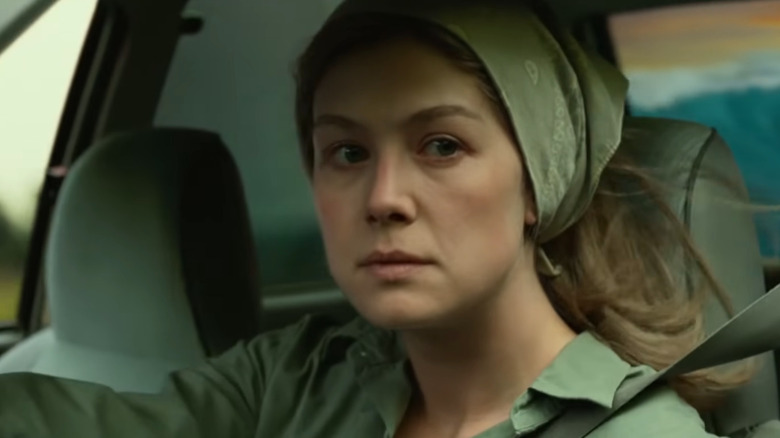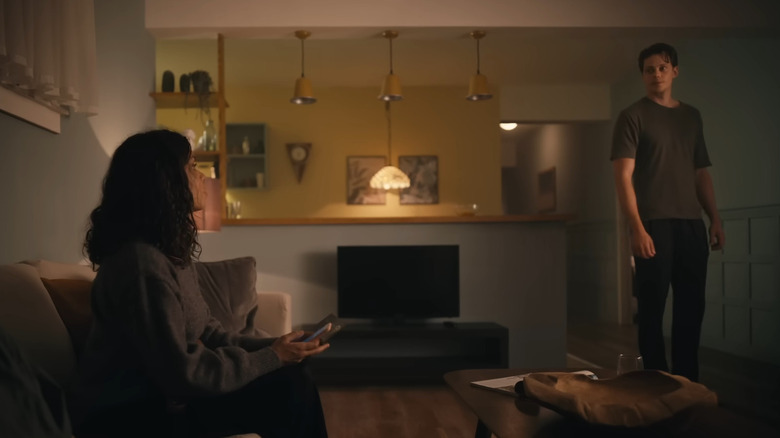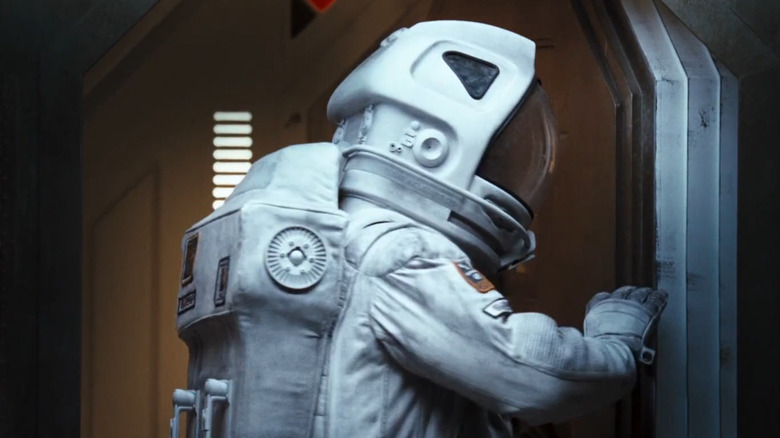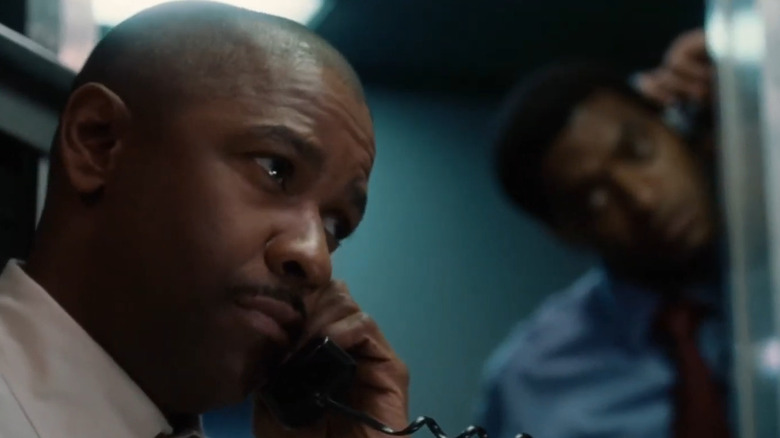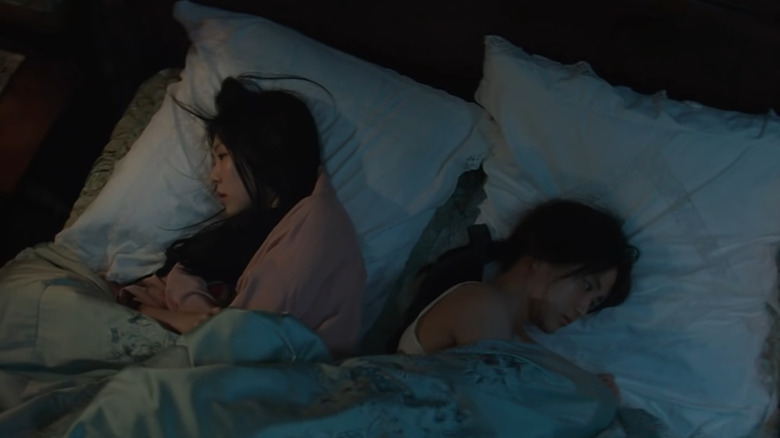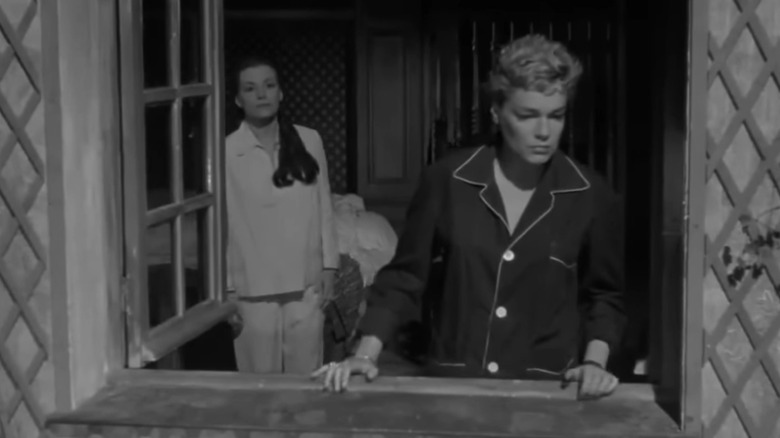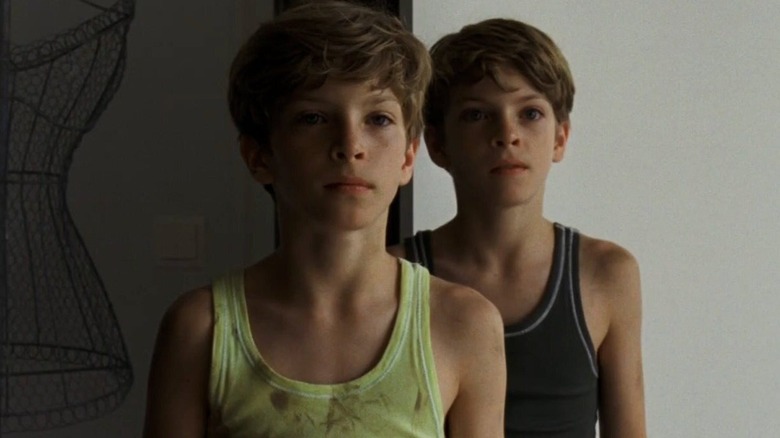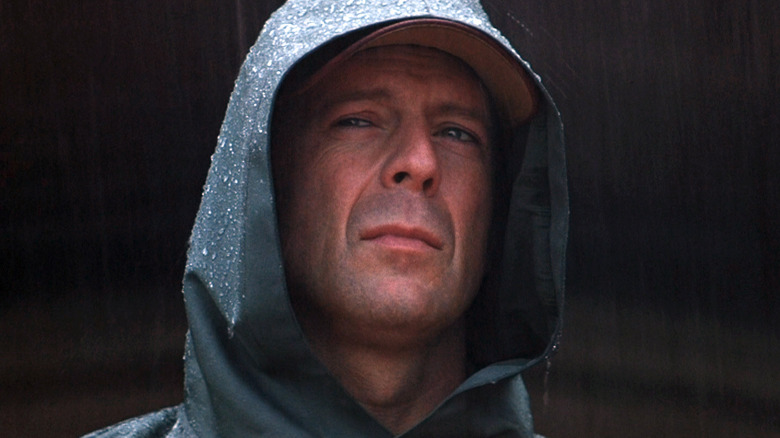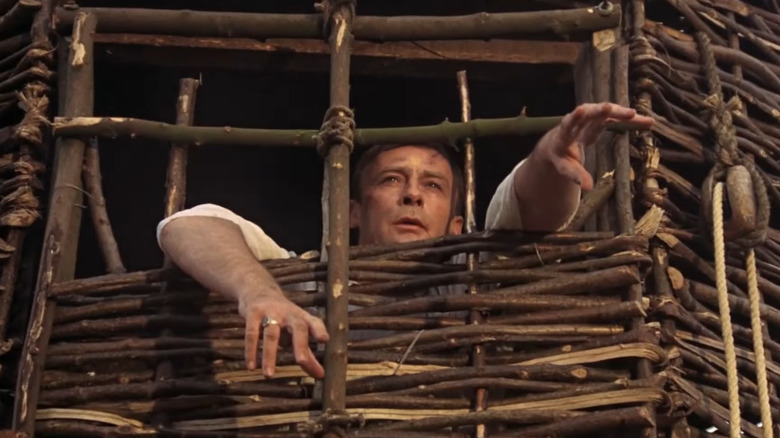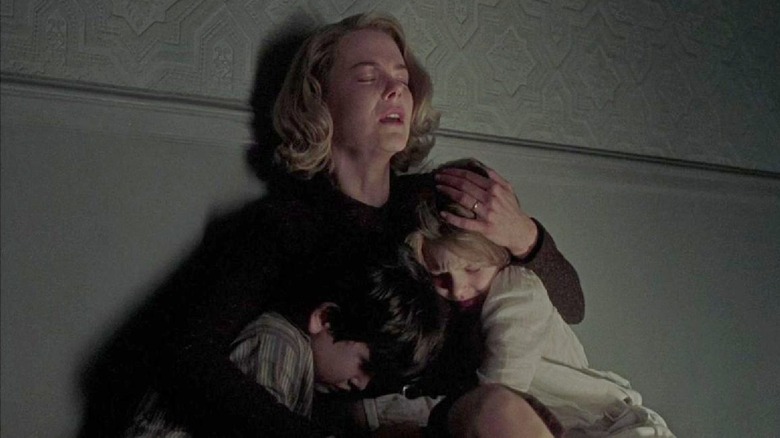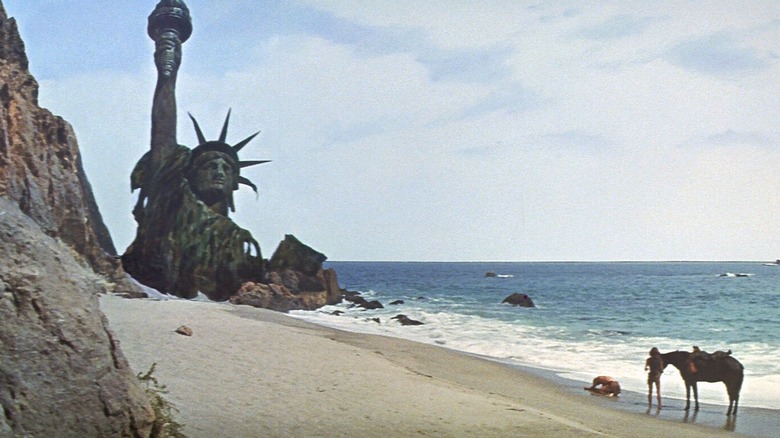The Greatest Movie Plot Twists Of All Time
Ever since the dawn of cinema, filmmakers have been trying to blow our minds with crazy plot twists and surprise endings. These shocking scenes are hard to get right, and if they don't stick the landing, they can completely ruin a film (we're looking at you, "Spectre"). But if they're done well, they can take a movie from "good" to "legendary." Plot twists can shed new light on everything that came before, send a movie in a new direction, and make moviegoers gasp in astonishment.
Maybe that mild-mannered dude in the corner was really the big bad guy. Perhaps the hero was dead the whole time. Or maybe everything we've seen is somebody's hallucination. Whatever the reveal, these memorable moments catch us off guard and leave us talking for years to come. From time-traveling aliens to disappearing devils, these are the greatest movie plot twists of all time. As you can probably guess from the title, everything here is a major spoiler.
Arrival (2016)
With few exceptions, movies are told in chronological order. There's a beginning, a middle, and an end. But "Arrival" is unmoored by time, much like its protagonist, Dr. Louise Banks (Amy Adams). In the movie's opening, we watch Louise lose her beloved daughter to disease. Naturally, we assume this is happening early in her life, before the renowned linguist is asked by the military to communicate with the heptapods — mysterious aliens who've landed on Earth. Her job is to translate their complex language so humans can talk with these otherworldly visitors.
But as she delves deeper into their circular alphabet, the heptapod language changes her perspective of time, literally allowing her to experience the past, present, and future at once. And as we soon discover, Louise actually hasn't had her child yet. Those flashbacks are visions of what's to come, courtesy of the alien language. Louise now exists outside of time, or more accurately, throughout every moment all at once. As a result, Louise's perspective on concepts like love are radically altered by the heptapods' gift. Sure, she now knows that heartbreak is coming, but she heads into the future anyway, because she knows there's a lot of joy waiting there too. It's maybe the most emotional twist in all of science fiction, and one that will leave you both thinking and wiping away a few tears.
A Beautiful Mind (2002)
"A Beautiful Mind" finds an Oscar-nominated Russell Crowe playing John Nash, a Nobel Prize-winning mathematician who lived a rather unusual life. Early in the film, Nash is drafted by Department of Defense Agent William Parcher (Ed Harris) to analyze magazines and newspapers for hidden Russian codes. It's an intense assignment, but when he's not engaged in high-stakes espionage, John seems to lead a normal life. He's got a supportive wife (Jennifer Connelly) and an incredibly close BFF, Charles (Paul Bettany). And whenever Charles shows up to visit, he brings along his adorable niece, Marcee (Vivien Cardone), who always brings a smile to John's face.
Unfortunately, of the four most important people in John's life, only one of them is actually a living, breathing human being. As it turns out, John is suffering from paranoid schizophrenia, and the incredibly creepy Parcher is just a hallucination. There are no secret messages, no Soviet spies lurking in the shadows, and no radium diode implanted in his arm (something John learns the hard way). But the real blow is that Charles and Marcee are also products of his imagination. All those memories of Charles and John palling around Princeton? None of it's real. And unless you know the true story — or noticed those unflappable birds — the twist comes as a devastating surprise and sends this Oscar-winning film in a disturbing direction.
Colossal (2016)
Directed by Nacho Vigalondo, "Colossal" is one of the wackiest movies ever made. This fantasy flick finds the alcoholic Gloria (Anne Hathaway) recently single and moving back to her hometown. But as the self-destructive drunk soon discovers, her problems are a lot bigger than just the bottle. Gloria is psychically linked to a Godzilla-like monster, and whenever she stumbles across a particular playground at a specific time, the kaiju mysteriously appears in the city of Seoul.
Fortunately, Gloria has a good friend to help with all the booze and oversized beasts: her childhood buddy Oscar (Jason Sudeikis). The moment Gloria comes back to town, Oscar does everything he can to help her feel at home. But Gloria soon realizes there's a lot of darkness behind Oscar's winning smile.
For one, he's also linked to a giant creature that appears in the South Korean capital. And while he pretends to be a good dude, we quickly learn he's a violent, manipulative control freak, more monstrous than any kaiju. And when Gloria tries to get away from this creep, he threatens to murder countless Koreans with his robot avatar. This turn from best friend to abuser is pretty shocking, largely thanks to Sudeikis' affable persona ... although there are probably a lot of women who saw this coming, well aware that the real world is full of Oscars.
If you or anyone you know needs help with addiction issues, help is available. Visit the Substance Abuse and Mental Health Services Administration website or contact SAMHSA's National Helpline at 1-800-662-HELP (4357).
Ex Machina (2014)
One of the most unsettling sci-fi movies ever made, "Ex Machina" finds mild-mannered computer programmer Caleb (Domhnall Gleeson) picked to spend a week conducting a bizarre Turing test with his billionaire boss, Nathan (Oscar Isaac). A brilliant inventor, Nathan has created an artificial intelligence named Ava (Alicia Vikander), and he wants to see if his creation can convince Caleb she's a sentient being.
Caleb quickly falls under Ava's spell, and soon, the programmer plans to free his crush from Nathan's grasp. After all, the tech tycoon has her locked up and plans on essentially killing her. Plus, Nathan's interest in Ava isn't just scientific — this guy has a thing for building female robots that he can imprison and control. Using his own tech savvy, Caleb sets Ava free, and seconds later, the liberated android slices through Nathan like he's a pat of hot butter.
If this were your typical sci-fi flick, Ava and Caleb would probably run off together, but in "Ex Machina," things take a hard left turn when Ava locks up Caleb and leaves the screaming programmer to die of starvation. It's a gut punch of an ending, especially since Caleb seems so sympathetic. But really, he only decides to help Ava once he finds her worthy of his affections, and chances are good he would jeopardize her shot at freedom in the outside world. So when it comes to dealing with a "nicer" version of Nathan or leaving the dude to die, nothing's stopping Ava from finally getting her freedom.
Get Out (2017)
It's no surprise that the Armitage family are the bad guys in "Get Out." When Missy Armitage (Catherine Keener) and her husband (Bradley Whitford) first meet our hero, Chris Washington (Daniel Kaluuya), they're way too friendly and polite. That's never a good sign in a horror movie. Then there's their super creepy son, Jeremy (Caleb Landry Jones), who's oozing with menace. Yet his girlfriend Rose Armitage (Allison Williams) seems totally on his side. She sticks by Chris when he's getting harassed by a cop, so she'll definitely help him escape her racist family's clutches ... right?
Unfortunately, Rose is probably the most evil Armitage of the bunch. After finding a box of incriminating photos, Chris starts to realize he's the victim of some really cruel catfishing. But even after he decides to run, he desperately hopes Rose is still on his side. He begs Rose to give him the car keys so he can escape, and for a moment, it seems like she might pick her boyfriend over her own flesh and blood ... but then she just smiles and says no way.
The casting here is what makes the twist work so well. According to both Allison Williams and director Jordan Peele, Williams was cast because audiences would associate her with far less evil roles, like Marnie Michaels from "Girls." And she does indeed seem pretty harmless, right until she starts drinking milk like a Droog and blasting at her boyfriend with a rifle.
Kill List (2011)
Messing around with creepy European cults is never a good idea. That's a lesson our murderous antihero learns the hard way in Ben Wheatley's "Kill List." This disturbing horror film finds Neil Maskell as Jay, a family man whose marriage has fallen on hard times. And, oh yeah, he makes his living as a contract killer. You've got to put food on the table somehow, and Jay stands to make a tidy paycheck by killing three people for a mysterious client. But the targets don't behave like typical victims. Instead of begging for their lives, they actually thank Jay when he shows up for some hammer time.
Things go from eerie to straight-up hellish when Jay tries to kill his third victim. Instead of finding his target, he stumbles into a cult right out of "The Wicker Man." This whole assassination scheme is part of an elaborate occult ritual, and it comes to a bloody end when the pagans capture Jay, put a mask over his face, and force him to fight a cloaked hunchback. The assassin makes short work of his deformed foe, but after turning this guy into a shish kebab, Jay discovers a horrific truth — the hunchback is really his wife and son, kidnapped by the cult and tied together, with his son on his wife's back. Jay's just murdered his own family, much to the delight of the deranged cult, capping off a ghastly film with a truly gruesome ending.
Lone Star (1996)
On its surface, "Lone Star" is a dust-bitten mystery set in a small Texas town. The skeleton of a corrupt sheriff is found out in the desert, and everybody wonders if his deputy put a bullet in his brain. But the movie also works as an exploration of U.S. history, an analysis of American race relations, and a look at multi-generational family conflicts.
Matthew McConaughey plays Sheriff Buddy Deeds, a larger-than-life lawman who disapproves of his son's love life. His boy, Sam, is crushing hard on a girl named Pilar, but Buddy stops their relationship before it gets off first base.
Years later, after Buddy's death, grown-up Sam (Chris Cooper) and Pilar (Elizabeth Pena) finally hook up, but the two soon discover why Buddy was dead-set on keeping them apart. As it turns out, Buddy had an affair with Pilar's mom... so yeah, Pilar is Sam's half-sister. But despite the fact that they're related, Sam and Pilar decide to stay together. Pilar can't have any kids, so there's no worries there, and while it's obviously a controversial decision, the movie also kind of leaves you rooting for their twisted romance.
Mother (2009)
Bong Joon-ho's "Mother" has a pretty standard plot for a murder mystery. A mentally challenged young man (Won Bin) is accused of murdering a teenage girl. The police don't have any solid evidence against him, but they need to make an arrest, so they toss the handicapped man in jail and trick him into confessing. Needless to say, his devoted mother (Kim Hye-ja) knows her son is innocent, and she goes from a mild-mannered widow to South Korea's Sherlock Holmes, chasing down leads, interrogating suspects, and putting together a case to free her son from jail. She even discovers a possible scheme involving blackmail and a mysterious old man.
Now, in your typical murder mystery, the mom would discover the killer's true identity and clear her kid's name. However, "Mother" subverts all those expectations when the titular mom makes a simple but shocking discovery: her son really did it. Yeah, he's a sweet kid, and yes, he's mentally handicapped, but that didn't stop him from caving in a girl's head. It's a smart little twist that gets even twistier when the mom murders an eyewitness. "Mother" spins every thriller trope on its head, but it also goes to show that nobody loves you like your mother.
Scream (1996)
Every slasher villain has their own special skill. Freddy Krueger can control your dreams. Jason Voorhees can take anything you throw his way and just keeps on coming. And then there's Ghostface, who's got the uncanny ability to pop up anywhere at a moment's notice. When the masked killer first arrives in the opening scene of "Scream" — terrorizing poor Drew Barrymore — he seems to be lurking around every single corner. There's no way anyone can move this quickly, but as victim after victim learns, there's no getting away from Ghostface. This dude is everywhere.
In the big climax of Wes Craven's horror classic, we discover the secret behind Ghostface's teleporting powers. Final girl Sidney Prescott (Neve Campbell) is running for her life. The masked murderer has shown up at a high school party, and he's slicing people left and right. Sidney has no clue who's under the mask, and the movie has offered us a whole bunch of possibilities. Ghostface could be boyfriend Billy (Skeet Ulrich), weirdo Randy (Jamie Kennedy), goofball Stu (Matthew Lillard), or even Sidney's own dad (Lawrence Hecht). There are so many suspects, and we don't know who to trust.
And that's when Sidney makes a horrific discovery — her boyfriend Billy is Ghostface ... and so is his best bud Stu. These two psychos are working together, Columbine-style, for a maximum kill count. And with two guys running around wearing Ghostface masks, it's no wonder this bad guy was making such good time.
The Sixth Sense (1999)
M. Night Shyamalan has a really weird filmography, but no matter where his career goes, he'll always have one thing to fall back on — he made "The Sixth Sense," an all-time great horror movie with possibly the most famous twist in cinematic history.
The film finds Bruce Willis playing Dr. Malcolm Crowe, an award-winning child psychologist, and in the opening scene, he's shot by a disturbed patient he couldn't save. But a couple of months later, Crowe is walking around and seems perfectly okay. Well, his marriage is falling apart, and his wife won't acknowledge his existence, so that isn't great. But at least he gets a chance at redemption by helping Cole Sear (Haley Joel Osment), a troubled boy who can see dead people.
However, Cole isn't the only one who can see spirits. Moviegoers have been looking at a dead guy pretty much since the start of the movie. After trying so hard to talk to his wife, Crowe finally realizes why she won't respond: he's a ghost. That gunshot in the beginning of the film? Yeah, Crowe didn't make it, and he's been a dead man walking ever since. It was an ending that sent shockwaves through Hollywood, and Shyamalan has been trying to recapture that glory ever since. But while a film or two has come close, "The Sixth Sense" still stands supreme as the perfect Shyamalan twist.
Star Wars: The Empire Strikes Back (1980)
Everybody knows the twist from "The Empire Strikes Back." Even moviegoers who've never seen a single "Star Wars" movie know Darth Vader is Luke Skywalker's dad. The twist has permeated the pop culture consciousness, and the line "No, I am your father" has become one of the most memorable (and misquoted) lines of all time.
But back in 1980, the Luke-Vader revelation absolutely floored "Star Wars" fans. Most of the cast and crew didn't even know the truth about Luke's family tree. According to Mark Hamill, the original script read that Obi-Wan Kenobi had murdered old Anakin. Famously, only Hamill, James Earl Jones, George Lucas, and director Irvin Kershner were aware of the twist. So when Vader finally pronounced his parentage, everybody was gasping — from audiences to the actors themselves.
And this shocking moment did a whole lot more than elicit gasps. The Dad Vader reveal sent the series in a completely new direction, and that one line laid the groundwork for seven additional "Star Wars" films. Has any other movie twist had such an enormous impact? Well, as Luke Skywalker might say, nooooooooooooo.
Star Wars: The Last Jedi (2017)
"The Last Jedi" is one of the twistiest chapters in the entire "Star Wars" franchise. We learn that Rey's parents are nobodies. Big bad Snoke gets cut in half. Princess Leia is secretly Mary Poppins. It's twist after crazy twist, but the biggest shock comes early in the film, when Luke Skywalker reveals his Jedi days are done.
To set the scene, we have to go back to 2015, when "The Force Awakens" was teasing audiences with the promise of Luke Skywalker. The entire premise of Episode VII involved a group of heroes searching for the legendary warrior. Finally, at the end of the film, Rey (Daisy Ridley) finds the bearded Skywalker standing on the cliffs of Ahch-To. Rey hands the Jedi his long lost lightsaber, and that's where the film ends — with Rey reaching out to the hooded, silent hero. Audiences had to wait two whole years to see what would happen, but obviously, Luke was going to take the lightsaber and lead the charge against the First Order ... right?
Not exactly. As "The Last Jedi" begins, Luke takes his lightsaber and tosses it into the ocean. In the years since we last saw him, Luke has turned his back on the Force and wants the Jedi to die out. This little twist flew in the face of fans' expectations, but really, they should have listened when the trailer warned, "This is not going to go the way you think."
Sorry to Bother You (2018)
If Terry Gilliam, Karl Marx, Spike Lee, and Rod Serling all teamed up to make a movie, it might look like "Sorry to Bother You." Written and directed by Boots Riley, this movie is absolutely insane in all the right ways, and no description can do it justice. It's without a doubt the most anti-capitalist film to ever come out of Hollywood, and it features perhaps the most deranged twist of the 21st century so far.
The plot follows a promising young telemarketer named Cassius "Cash" Green (Lakeith Stanfield) who finds success in sales by using a "white voice" to smooth-talk customers. Soon, Cash is promoted to the big-time, which involves selling slaves to giant companies, and eventually, he crosses paths with a psycho billionaire (Armie Hammer) with big plans for the future of business. Up until this point, the movie has been incredibly weird — for example, Cash's David Cross impersonation is spot-on — but when Cash discovers the billionaire's plans, that's when the movie loses its mind. As it turns out, the billionaire is turning people into half-human, half-horse monsters so he can create a powerful but malleable workforce.
That's right. Armie Hammer is turning people into horses. And if that wasn't wild enough, the movie ends with Cash suddenly turning into an "equisapien" himself. It's totally bonkers, and no matter how good you are at guessing twists, you'll never see this nightmare coming.
Spider-Man: Homecoming (2017)
From the Mandarin reveal to the Thanos snap, the MCU has its fair share of shocking twists. But maybe the most jaw-dropping moment comes in "Spider-Man: Homecoming," when Peter Parker (Tom Holland) discovers his love life is about to get really complicated.
Throughout this superhero flick, the wall-crawler is trying to find a balance between homework and crime-fighting, hanging out with friends and trading blows with bad guys. You can't really go to parties or participate in the academic decathlon when you've got an entire neighborhood to protect. The guy can't even impress his high school crush, Liz (Laura Harrier), without having to deal with a supervillain. It's hard to get a date when you're constantly trying to fight the Vulture (Michael Keaton), a winged thief who sells alien weapons to local thugs.
Eventually, Peter puts his crime-fighting on pause and takes Liz out to the homecoming dance. He gets his suit, learns to dance, buys Liz a nice corsage, and shows up at her house, ready for a fun evening. And that's when the door opens to reveal the Vulture himself. As it turns out, this murderous villain just so happens to be Liz's father. Suddenly, Peter isn't worried about making a good impression. He's just worried about making it through the night alive. After all, nothing ruins a date like a great big superbattle.
Us (2019)
Two years after terrifying audiences with "Get Out," Jordan Peele frightened everyone again with "Us," a freakish horror film with a genuinely shocking ending. The film opens in 1986, when a young Adelaide Thomas (Madison Curry) wanders into a hall of mirrors and meets her diabolical doppelganger. Flash forward a couple of decades and adult Adelaide (Lupita Nyong'o) is confronting her evil twin yet again. Only this time, the doppelganger — known as Red — has brought an army of scissor-wielding clones up from their underground lair, with each assigned to kill their real-world counterpart.
Throughout the film, Adelaide and her family manage to outwit and defeat their doubles, and in the climactic sequence, our hero finally confronts her twisted doppelganger. But in a stunning flashback, we suddenly realize we might be rooting for the wrong person. As it turns out, Adelaide is actually the grinning doppelganger from the opening scene. She's the result of a science experiment gone wrong, and when she encountered the real Adelaide in the fun house, she strangled the girl unconscious, dragged her down into an underworld of mute monsters, and then took the real Adelaide's place.
So Adelaide is really Red, and Red is the real Adelaide, and this whole creepy scheme has been about getting revenge for having her life taken away. Ultimately, the twist works as commentary on issues like privilege and nature vs. nurture, but in the moment, all you can really think about is picking your jaw up off the floor.
The Usual Suspects (1995)
The twist ending of "The Usual Suspects" is almost more famous than the movie itself. The entire film is narrated by Verbal Kint (Kevin Spacey), sole survivor of a heist-gone-wrong. Verbal is a timid thug who suffers from cerebral palsy, and as he's being interrogated by Customs agent Dave Kujan (Chazz Palminteri), Verbal spins a story of how he and his crew were drafted by the world's most notorious criminal, an underworld bogeyman named Keyser Soze. As Verbal tells his crazy story, Kujan suspects Verbal's BFF, Dean Keaton (Gabriel Byrne), was secretly Soze, and that he betrayed all his buddies during their bloody caper. Convinced he's solved the crime, he lets Verbal walk and takes a minute to revel in his detective skills.
And that's when he notices the bulletin board. Shocked, Kujan realizes that Verbal's story was complete nonsense, and that he assembled his wild tale by pulling keywords and details from the papers and wanted posters tacked on the wall. And as Kujan figures out he let a guilty man walk free, we see Verbal Kint morph into a new man. His limp disappears, his gnarled hand straightens out, and he starts walking with the confidence of a crook who beat the system for the millionth time. This little nobody is actually Keyser Soze, and then, like that, he's gone. It might be the greatest trick a movie's ever pulled, and it's the kind of twist that will make you drop your coffee mug in shock.
Parasite (2019)
Even with hits like "Memories of Murder" and "Snowpiercer" already under his belt, Bong Joon-Ho stunned audiences with "Parasite," a subtle examination of the relationship between one family that has nothing (the Kims) and another that has everything (the Parks). After a friend of the young Ki-Woo (Choi Woo-shik) invites him to lie his way into the wealthy Park home to act as a tutor, Ki-Woo goes one step further by getting his entire family jobs. This quickly spins a web of deception that we sense won't end well, but it's the carefully calculated deterioration of everyone's lives that makes this film the wild ride it is.
"Parasite" is full of commentary on the toxicity of the super-rich, but the societal con that sees underprivileged people fighting each other for scraps is the glue that holds the whole mess together. When the Kims begin feeling confident in the Park family's dependency, they have an audacious living room gathering while the family is away. While we expect them to be found out by the Parks, what actually happens is even more jarring.
Moon-gwang (Lee Jung-eun), whose life they ruined by getting her fired to protect their own deceit, returns, begging to be let inside. We discover she's been keeping her husband in the basement of the Park family home for years, unknown to the Parks. This is just one of the developments that signifies imminent disaster for all, one of the most surprising moments in a film full of reveals.
Psycho (1960)
Marion Crane (Janet Leigh) yearns to settle down with her boyfriend Sam (John Gavin), but his debts are preventing them from finding happiness together. Stealing the money he needs from her job and going on the lam, she is forced to take overnight refuge at the isolated Bates Motel. There she meets what she assumes to be an overall harmless weirdo named Norman Bates (Anthony Perkins), who shows her to her room. Sadly, Marion has caught the attention of his mother Norma. Marion will never leave the hotel, while Norman is forced to cover for his "mother's" crimes.
"Psycho" is easily one of director Alfred Hitchcock's most notorious thrillers, and even decades later, it's easy to see why. Though best remembered for its more shocking scenes, those only succeed due to the incredible tension-building of the "quieter" moments. Sure, it's terrifying that women are going missing at this mysterious hotel on a lonely highway, but "relaxed" moments where Norman Bates casually explains his interest in taxidermy are arguably more frightening, if only in retrospect. Still, "Psycho" has two major twists, with the first being the surprise death of Marion, the film's point of view character, within the first half hour. Additionally, the reveal that Norman's mother has been dead all along, and that Norman is channeling her in his own mind, is still scary today.
Friday the 13th (1980)
"Friday the 13th" has a unique place in film history, being an independent production that gained major distribution at a time when that was essentially unheard of. Not only spawning a huge franchise in its own right but also helping to herald in a new era of slashers, "Friday the 13th" is sometimes referred to as a surface-level response to "Halloween," but there is a fair amount of social commentary at play in the script. Though it would be a stretch to call it nuanced, the lack of accountability at summer camps during the time is a catalyst for much of what occurs, as is the cruelty and neglect toward a disabled boy named Jason Voorhees (Ari Lehman) that it allows.
Though we are told that Jason drowned in the lake, the heavy boots and bulky jacket of the masked killer lead us to believe that he continues to stalk the campgrounds, killing the new teen counselors. However, it turns out that Pamela Voorhees (Betsy Palmer) is in fact the killer, seeking vengeance for her son's horrible death. Even if this is seldom mentioned in the franchise's many sequels, it is nonetheless a part of horror history. Years down the line, this twist was used as a "gotcha" in the opening sequence of "Scream," in which the doomed Casey Becker desperately insists that the killer in "Friday the 13th" was Jason, only to be rudely corrected that it was in fact Mrs. Voorhees in the first film.
Coco (2017)
In Miguel's (Anthony Gonzalez) home, music is banned due to his great-grandmother Imelda (Alanna Ubach) having been abandoned by a wayward musician many years before. The daughter of this tryst, Coco (Ana Ofelia Murguia), is Miguel's elderly grandmother, her life having been in many ways decided by her father's disappearance. Miguel has a natural knack for music, but his responsibility to his family weighs heavily upon him. Idolizing the musician Ernesto de la Cruz (Benjamin Bratt), Miguel becomes convinced that Ernesto was his great-grandfather. This leads Miguel to announce his intention to become a musician, but his grandmother wrecks his guitar. Obtaining Ernesto's mythical guitar, Miguel gains the ability to converse with his dead relatives.
Miguel forms an alliance with a ghost named Hector (Gael Garcia Bernal), eschewing his great-grandmother's blessings in favor of finding Ernesto. Though Ernesto initially welcomes Miguel as family, his deceptions are soon revealed. Indeed, Hector was actually Miguel's great-grandfather all along, and he only abandoned his family because he was poisoned to death by his jealous musical partner Ernesto. Naturally, this leads to a bittersweet conclusion, with Hector finally honored for his musical genius and reunited with Imelda and Coco, albeit in the land of the dead. The family ends the ban against music, allowing Miguel to finally pursue his dream and honor his family. As for Ernesto? Well, he doesn't fare as well, but what with all the lies and murder, we're okay with that.
Citizen Kane (1941)
There are many films you should watch at least once in your life, and "Citizen Kane" sits right around the top of that list. Widely regarded as one of the most game-changing films ever created, it remains not just strikingly relevant in a political and philosophical sense, but it also happens to be stunningly beautiful. Tapping into inventive camera angles while telling the story of an unknowable man through the eyes of the people around him, this movie might have flopped on its release, but it also cemented Orson Welles's legacy as one of the greatest filmmakers of his era. Today, it wouldn't be nearly as controversial to assert that there is something foul at the heart of an American Dream that allows corrupt men like Kane to rocket up the ladder of success, but "Citizen Kane" was shocking for its time.
The story follows a reporter attempting to get to the heart of the man behind the myth after he passes away, whispering a final word: "Rosebud." Kane's (Orson Welles) story begins with his childhood as he attempts to strike the legal guardian that would dictate the direction of his life with a sled. It ends with this same sled, engraved with the word "Rosebud," burning in an incinerator. Whoever Kane was deep down, he died longing for his final moment of childlike innocence before he was set on the path of becoming a "great man."
Fight Club (1999)
Chuck Palahniuk's novel "Fight Club" inspired one of the best-loved cult classics of the last 25 years with the 1999 movie version starring Edward Norton as a Narrator disillusioned with the mundanity of his life. The more flamboyant Tyler Durden (Brad Pitt) appears to echo his own long-held criticisms against his capitalist lifestyle, giving a mouthpiece to his anger. Together, they start Fight Club, which is exactly what it sounds like. Amassing a cult-like following of men desperately seeking something to lash out at, it's a pretty short road to extreme criminal behavior and increasingly bizarre acts of vandalism.
As our Narrator realizes that he's completely losing control to Tyler's chaotic vision for their "Project Mayhem," Durden's girlfriend Marla (Helena Bonham Carter) drops the bomb by calling him "Tyler." That's right, the Narrator was actually Tyler Durden all along. Though he makes harried attempts at preventing Durden's plan of "erasing debt by bombing buildings" (seriously, do not try this at home), even he is unable to stop Project Mayhem. On the plus side, he seems to expel the Durden presence from his mind, although the film wraps on a fairly ambiguous note in that regard. Either way, he realizes what a jerk he's been to Marla, and together, they watch the buildings fall to the tune of a Pixies song.
Soylent Green (1973)
Taking place in what was then the far-flung futuristic year of 2022, "Soylent Green" has a twist so well-known that, even if you haven't seen the film, chances are that you know its most famous line. At first, we are only told that Soylent is a cheap, nutritious food staple that comes in several flavorful varieties, such as Soylent Red, Soylent Yellow, and the new Soylent Green. The narrative predicts a world on the verge of climate collapse that we assure you in no way resembles the actual Earth of 2022. Detective Robert Thorn (Charlton Heston) is investigating the murder of a Soylent board member who appears to have been assassinated. Spoiler alert: it really does not work out great for him.
Thorn's elderly friend Sol Roth (Edward G. Robinson) uncovers that Soylent Green, once made of plankton, is no longer possible to manufacture due to the effect of pollution and global warming on the ocean. Naturally, the Soylent board opts for the next best thing to plankton, human corpses. Roth takes his own life with assistance, using his last words to tell Thorn the truth. This leads to the famous final scene of Thorn — badly wounded by a Soylent assassin — screaming, "Soylent Green is people!" although it seems questionable what effect this has in a completely fictional world in which climate change directly caused by rampant corporate greed threatens the future of humanity.
The Cabinet of Doctor Caligari (1920)
Another film whose reputation likely precedes it, "The Cabinet of Doctor Caligari" kickstarted the German Expressionist film movement that thrived during the post-World War I, pre-World War II time known as the Weimar era. Its status as a classic is so cemented that it has been regularly referenced and spoofed in the ensuing decades, but at the heart of it all is an eerie film that will stay with you long after the credits roll. Sitting on a bench and sharing his incredible tale, Francis (Friedrich Feher) informs us that he and his friend Alan (Hans Heinrich von Twardowski) loved the same woman, Jane (Lil Dagover). Their friendly competition to win her affection was thrown into chaos when Doctor Caligari (Werner Krauss) and his murderous somnambulist Cesare (Conrad Veidt) set their sights on her.
Cesare kidnaps Jane out of her bedroom at night and carries her across a nightmarish city landscape while pursued by a crowd attempting to rescue her. Cesare eventually collapses and dies due to the stress of the chase, and Francis is able to have the evil Caligari institutionalized. But it actually turns out that all of this happened in Francis's head, and he's the one in the institution, which is run by Doctor Caligari. Fortunately for him, Jane and Cesare are there, too, even if they don't seem to have much interest in him. The film closes with Caligari confidently stating that he will be able to cure Francis, but let's just say we have our doubts.
Saw (2004)
It's easy to take for granted what a huge deal "Saw" was for horror fans when it was first released. That is due in no small part to the twist ending, but the set-up is where all the magic happens. It opens on a photographer named Adam (Leigh Whannell) and a doctor named Gordon (Cary Elwes), each chained to pipes in a room with a dead body lying facedown between them. Each has a microcassette in their pockets, with Adam's urging him to survive while Gordon's orders him to kill Adam by 6 o'clock. This leads Gordon to realize that they are in the hands of the so-called "Jigsaw killer," known for kidnapping victims and forcing them to participate in elaborate "games."
It turns out that Gordon is a major suspect in the Jigsaw case, having attracted the attention of Detective Tapp (Danny Glover), who sent Adam to spy on him. This leads to a series of reveals that has the audience believing that just about every character in the film could possibly be the real Jigsaw at one point or another. Ultimately, a desperate Gordon frees himself, but only by sawing off his own foot. This in turn comes with the realization that they got everything about Jigsaw's true identity wrong. Adam looks on in horror as the corpse on the floor rises to its feet, revealing himself to be Gordon's patient, John Kramer (Tobin Bell), the real Jigsaw. "Game over," he says, leaving Adam to die a slow death.
High Tension (2003)
Today, Alexandre Aja is known for his significant contributions as a horror director, but it was the bloody "High Tension" that first put him on the global map. According to some reports, the film takes its cues from Dean Koontz's novel "Intensity," which follows the survivor of a devastating series of home invasion murders as she attempts to stay alive and unnoticed by the killer. "High Tension" takes the brutality of the Koontz novel up several notches, which is no small feat considering the grisly subject matter. Here, Alex (Maïwenn) invites her friend Marie (Cécile de France) to spend a weekend with her family. Marie has a serious crush on Alex, but Alex seems oblivious to this.
This all takes a backseat to the horror as a serial killer storms the house, killing Marie's family right down to their beloved dog. Alex manages to survive all this, but she's been taken captive by the killer and tied up with duct tape over her mouth to prevent her from screaming. Marie vows to save Alex from the murderer, but there's only one major issue with that plan — Marie is the killer, and has deluded herself into believing that she is the final girl of the tale. Showing us video footage in which Marie commits the murders that horrified her so, this takes a decidedly darker turn than we initially suspect. Alex is able to escape Marie, who is then institutionalized, but a strange bond persists between them to the end.
Shutter Island (2010)
This sleek neo-noir takes a dive back into 1950s America, introducing us to Detective Teddy Daniels (Leonardo DiCaprio) and his new partner Chuck Aule (Mark Ruffalo). Together, they are investigating a psychiatric institute located on, you guessed it, Shutter Island. An inmate, Rachel Solando (different characters with the same name, played by Emily Mortimer and Patricia Clarkson), who had drowned her three children, has gone missing, and the hospital staff is unhelpful. Daniels becomes convinced that everyone on the grounds is part of a plot to misdirect the investigation, including Chuck. This is all made worse by his constant migraines and blackouts, possibly caused by his memories of serving in the military and witnessing the atrocities at Dachau.
When Rachel Solando reappears, she asserts that she's actually a psychiatrist working to develop mind control. Meanwhile, senior psychiatrist Cawley (Ben Kingsley) tells Daniels that he never arrived with a partner at all. Eventually, the man we knew as Chuck introduces himself as another doctor at the facility, Doctor Sheehan, informing us that Daniels is actually Andrew, a patient under their care. After Andrew failed to seek treatment for his manic-depressive wife Dolores (Michelle Williams), she killed their children, and he killed her. This left him with overwhelming guilt, and his delusions have, as such, made him a prime candidate for lobotomization. Yet even as Sheehan gives the order, he is left to wonder how powerful Andrew's delusions truly are, as he calls him by the name Teddy and Andrew does not respond.
Gone Girl (2014)
If ever there was a film that is more a cascading series of twists than a linear narrative story, that would be "Gone Girl," but it starts with a basic murder mystery. When his wife Amy (Rosamund Pike) goes missing, Nick's (Ben Affleck) general disinterest in the subject raises red flags for pretty much everyone. He and Amy had an unhappy union after relocating from New York to small town Missouri, which in turn saw him beginning an affair with a student named Andie (Emily Ratajkowski). Things just get messier from there, with a scavenger hunt leading authorities to discover a partially burnt diary in which Amy discloses her apparent fear of Nick. We soon find out, however, that Amy has been alive all this time and is simply hiding out in the Ozarks, getting her kicks by messing with everyone from afar.
Considering that we were pretty ready to say "goodbye" to Nick for killing his wife, this is a stunning moment, but with Amy, the twists never end. Hapless exes are caught in her crossfire, as is an increasingly lost Nick. Though he and his allies get to the bottom of Amy's revenge plot eventually, they are never able to prove anything and are all well aware of her status as a master manipulator. In the end, Nick is powerless to escape her. Even as her crimes escalate, he ultimately agrees to stay with her, and the two of them face the press together ... exactly as Amy wants.
Barbarian (2022)
"Barbarian" writer and director Zach Cregger apparently loves twists so much that he decided to make a whole movie of them. The story begins with the nightmare scenario of hero Tess (Georgina Campbell) showing up to an Airbnb only to discover that a stranger named Keith (Bill Skarsgård) is already staying there. This makes it seem like we're in for a fairly straightforward horror movie, yet the danger that Keith might pose goes on the back burner as Tess discovers a literal torture dungeon downstairs. When Keith is brutally killed by a naked, screaming woman covered in grime, it's clear that "Barbarian" is not going to follow the story we expect it to.
The story flips over to the homeowner, an actor named AJ (Justin Long), whose career is derailed when his costar comes forward with S/A allegations. Though he denies this, it's clear that he did something very wrong. Returning to his property in hopes of rebuilding, he comically fails to see the danger he's in and ends up trapped in the basement with Tess. Taking a trip back in time, we see that the standard stoic conservative man who previously owned the house still lives in the tunnels below. He spent decades dragging women into the basement to torture them, with the naked woman being his offspring. There are actually still more twists in this film, but we're running out of breath, so we'll just say that "Barbarian" is a great reason to skip the apps and book a hotel room.
Moon (2009)
Samuel Bell (Sam Rockwell) is hanging out on the moon alone, operating a mining facility with the assistance of a very anthropomorphized AI named GERTY (voiced by Kevin Spacey). Almost right off the bat, Sam experiences delusions and nearly dies when he crashes his lunar rover. However, he has no memories of this, and begins to suspect that GERTY is deceiving him. This is correct, and he discovers a doppelganger of himself at the site of the crash. Dragging his other self back to the base, he confronts GERTY, who explains that they are actually both clones. Though they are there to keep the station functional, their occasional deaths are expected by the company, which has granted GERTY the freedom to awaken new clones at will.
This is a pretty huge twist in and of itself, but the film is not done with us yet. The company the Sams work for has intentionally jammed signals to prevent him from ever successfully calling for help, meaning he is trapped there indefinitely. The two Sams work together to create an escape plan, with the older version agreeing to stay behind as the younger escapes back to Earth. Though he's able to expose the company that doomed him, this ends on a fairly bittersweet note for Sam, whose wife died on Earth several years before and whose other selves begin to die at around their third year of life.
Inside Man (2006)
Criminal ringleader Dalton Russell (Clive Owen) announces that he's pulled off the perfect heist in the beginning moments of "Inside Man," leaving the story to explain exactly what he means by that. Detectives Frazier (Denzel Washington) and Mitchell (Chiwetel Ejiofor) are put in charge of negotiations during the seizure of a Manhattan bank. This is anything but straightforward, as the robbers have forced the hostages into similar coveralls and masks, intentionally blurring the line between victim and perpetrator. Though Frazier and Mitchell pull out all the stops, including bugging pizza boxes they send into the bank, the robbers seem two steps ahead of their every move.
Frazier is convinced that Russell may be a criminal but he isn't a killer, which Russell responds to with a mock execution. However, at all moments, there is a lot more than meets the eye at play in "Inside Man." Though it benefits Russell to have Frazier believe he is capable of murder, he has a surprising level of morality behind his decisions. With the police unable to distinguish the difference between hostages and robbers even after their release, we see that Russell actually stays hidden and calmly walks out a week later. It really was the perfect heist.
The Handmaiden (2016)
Lots of the movies on this list are based on great novels that deserve to be read in their own right, and nowhere is that more true than "The Handmaiden," based on Sarah Waters's classic sapphic thriller "Fingersmith." Park Chan-wook took the setting from Victorian Britain to Japanese-occupied Korea, creating something that feels both respectful of the source material while creating something entirely its own. The story follows Lady Hideko (Kim Min-hee), who lives with an uncle named Kouzuki (Cho Jin-woong) who assisted the colonial rule, selling out his home for gold. Meanwhile, the con man Count Fujiwara (Ha Jung-woo) sends pickpocket Sook-hee (Kim Tae-ri) to spy on Hideko, hoping to trick her into marrying him, at which time he'll send her to an institution and steal her money.
Much like the book on which it is based, this movie is filled to overflow with treacherous twists and turns, but to make a long story short, Hideko and the "Count" turn out to have formed their own partnership, actually institutionalizing Sook-hee under her name. However, Hideko and Sook-hee are in love, and they are able to find one another once again. Despite dealing with master deceivers like her uncle and the "Count," they're both crafty enough to formulate plans of their own, removing these nefarious men from their lives and sailing together for parts unknown. You love to see it.
Les Diaboliques (1955)
Director Henri-Georges Clouzot has often been referred to as the "French Hitchcock," which should tell you what to expect from his most famous films. A pioneer in the realm of the thriller, Clouzot's masterwork may very well be "Les Diaboliques." Christina, a Venezuelan immigrant, is the owner of a troubled boarding school that's run by her tyrannical husband, Michel Delassalle (Paul Meurisse). Christina (Véra Clouzot) suffers from a heart condition that leaves her physically somewhat frail, making it difficult for her to manage either with or without her husband. Enter Nicole (Simone Signoret), a teacher with whom Michel is having an affair, who bonds with Christina due to their mutual abuse at his hands.
Together, they decide that the only way to rid themselves of Michel is to kill him. However, when his body goes missing, Christina begins to suspect that Michel is still alive, haunting the grounds and waiting for the perfect moment to strike. This ends in a startling conclusion as we realize that Christina's ally Nicole truly never intended to kill Michel. Indeed, they wanted to shock Christina into a fatal heart attack, which is just what happens when Michel comes lumbering toward her one night. This doesn't work out for Nicole and Michel either, but it's impossible not to feel Christina's horror in her last moments. The finale tells us that it's possible that Christina has survived, or is at least haunting the school grounds herself.
The Mist (2007)
Writer-director Frank Darabont waited many years for the chance to adapt Stephen King's "The Mist," a novella about a town in Maine in which the residents are suddenly surrounded by an all-encompassing fog. While this is ostensibly a simple creature feature, complete with tentacled monsters lurking in the mist that pick off residents at random, the behavior of everyday people in a crisis may be the true horror. David (Thomas Jane) and his son Billy (Nathan Gamble) are forced to take shelter with other townspeople in a supermarket as they attempt to cope with the apparent apocalypse, although not everyone wants to work together to survive.
Darabont organizes an excellent ensemble cast to deliver a message decidedly more upsetting than even the original Stephen King ending. In fact, that ending is exactly where the movie's major twist comes in. When David and some of the other residents choose to take their own lives rather than face the horror of the monsters lurking outside, he kills the others, including his child, and prepares to walk into the mist to meet his fate. But almost immediately, the mist dissipates as the military arrives and takes care of the threat with little problem. Realizing that he murdered his friends and loved ones for absolutely no reason, David screams in despair – perhaps joined by some members of the audience.
Goodnight Mommy (2014)
Twins Elias and Lukas (Elias and Lukas Schwarz) await their mother's (Susanne Wuest) return from cosmetic surgery, but they are unnerved to see her face is covered in bandages. As time goes on, they increasingly suspect that she isn't actually their mother, but has been replaced by an imposter. This is made worse by her generally distant behavior and the fact that she seems to completely ignore Lukas. The two attempt to figure out how to get this doppelganger to confess and tell them where their real mother is. This leads to them taking her hostage and torturing her as she desperately tries to convince them that she is in fact their mom.
As their abuse of the woman escalates, we discover that Lukas has been dead all along. Unable to cope with the loss of his twin, Elias finds it easier to believe his mother is a doppelganger than to consider that his brother isn't real. As tense as the entire film is, the final scenes are nothing short of terrifying as the mother begs her son to free her from a boobytrap he has sprung on her as the house burns around them. Filmmaking duo Veronika Franz and Severin Flala followed this tense piece of work with "The Lodge" (2019), and that one could just as easily have a place on this list as well. Long-held family resentment and their cataclysmic conclusions are the bread and butter of both films.
Unbreakable (2000)
M. Night Shyamalan is well-known for his twists, from the aforementioned "The Sixth Sense" to "The Village" and beyond. One of his most precisely delivered shocks is in the film "Unbreakable," which introduces us to a take on superheroes entrenched in day-to-day realism. Point of view character David (Bruce Willis) is traumatized, reeling due to being left as the sole survivor of a horrific train derailment that killed 131 other passengers. Soon, he meets Elijah Price (Samuel L. Jackson), known for his physical frailty, who posits that David has superpowers and is, as such, the hero of the story.
Rather than donning a cape and tights, David insists that he is no hero. More true to life, his attempts at crimefighting are messy and questionable, leaving him in the midst of an existential crisis as he tries to cope with his new reality. When he uses his powers of intuition on Price, he is stunned to find that the other man has actually orchestrated a number of apparently accidental tragedies, including the trainwreck that uncovered David's powers. Using his own theories of superheroes through much of the film to inspire David, we are stunned to realize that Price is actually a supervillain. Taking on the moniker Mr. Glass, he views David as his natural opposite as seen through the lens of comic book morality.
The Wicker Man (1973)
The original 1973 "The Wicker Man" is a true icon of British folk horror, and a big part of that legendary status is in the twist ending. Sergeant Neil Howie (Edward Woodward), a devout Christian, visits the isolated island of Summerisle to investigate the disappearance of a young girl named Rowan (Gerry Cowper). Disturbed by the paganism and cult behaviors of the island's residents, Howie is a man who believes he has total control at the outset only to be methodically stripped of any power whatsoever by the end of the film. The horror of the story is Howie's firm belief in his own authority and the realization that he has been nothing more than a pawn in a game that he doesn't realize is being played until it's far too late.
The islanders insist that Rowan never even existed, but Howie believes that this is all part of an elaborate cover-up. Believing that she will eventually become the "sacrifice" of the pending May Day celebration, he finds himself increasingly at odds with the residents of Summerisle. Discovering only the body of a rabbit in Rowan's supposed grave, he eventually tracks her down. Yet we discover that she is completely in on the ruse, and there's one little detail that Howie never anticipated. Rowan isn't the intended sacrifice for the mythical "Wicker Man" ... he is.
The Others (2001)
Shades of classic ghost stories like "The Turn of the Screw" can be found in writer-director Alejandro Amenábar's eerie 2001 chiller "The Others." Nicole Kidman stars as Grace Stewart, who lives in a vast mansion with her two young children in the aftermath of World War II. Because the kids are painfully sensitive to light, Grace keeps the house in darkness throughout the day. That makes it a perfect stomping ground for what appears to be the spirits of a family who lived the house previously — although it appears that the servants who dutifully tend to Grace and the children may actually be dead as well.
The twist, coming just two years after "The Sixth Sense," is that it's Grace and her children who are deceased — a despairing Grace smothered the children and took her own life when she learned that her husband was killed in the war. The "others" they're seeing are actually the living family that has bought the house following the tragedy. But even though the ghostly housekeeper, Mrs. Mills (Fionnula Flanagan) warns Grace that she'll have to learn to get along with the next occupants of the house, Grace doesn't seem quite ready to make nice as "The Others" comes to its haunting close.
Planet of the Apes (1968)
In the landmark 1968 sci-fi film "Planet of the Apes," Charlton Heston stars as Taylor, an astronaut who joins a deep space mission not just to explore the galaxy, but to get away from the fellow humans he's come to despise. A time warp sends Taylor and his crew barreling 2,000 years into the future, and they crash-land on a planet where evolution has flipped: intelligent, talking apes are the dominant species and humans are mute savages.
Forced to defend his species and aided by sympathetic chimpanzees who discover evidence of a human civilization that existed before that of the apes, Taylor escapes death at the hands of the sinister Dr. Zaius (Maurice Evans) — only to have his worst fears confirmed: he's been on Earth all along, with the apes ascending after humankind wiped itself out in a nuclear war. The image of Heston falling to his knees in front of a half-buried Statue of Liberty, screaming "God damn you all to hell!" to the skies, is one of the most powerful in cinematic history — and is easily one of its greatest twist endings.
